
In the world of gambling, in which chance and strategy meet, a unique tapestry of beliefs unfolds—one that braids luck, fate, and the enigmatic nature of casino games. Casinos, bustling with excitement and anticipation, are not just venues for placing bets; they are also arenas in which superstitions thrive. From the novice player to the seasoned gambler, these mysterious practices often shape how individuals approach the games they play, holding the belief that their actions can affect the outcome in ways that go beyond mere probability.
When players gather around roulette wheels, blackjack tables, and slot machines, the atmosphere is thick with stories of lucky charms, rituals, and codified behavior that defy logic yet provide a sense of comfort. Whether it’s wearing a specific outfit, following a particular sequence of bets, or even avoiding certain numbers, the attachment to various superstitions reflects a deep-rooted desire to control the uncontrollable. This article delves into the captivating world of casino game superstitions, investigating the beliefs that simultaneously entertain and mystify those who dare to play.
Historical Origins of Superstitions
Betting games have long been entwined with an array of superstitions that go back to ancient societies. The origins of these notions can be connected to humanity’s fundamental wish to influence the random outcomes connected with fortune and uncertainty. In ancient civilizations, games of chance were often linked to religious practices. Players would invoke blessings or request favor from deities, believing that their actions could affect the odds in their benefit. This groundwork laid the basis for the multitude of superstitions that spread as casino games evolved over centuries.
During the Middle Ages, gambling became a common hobby across Europe, and with it, a colorful tapestry of superstitions developed. Players adopted different rituals and charms, believing they could affect the results of games. The value of numbers, in particular, emerged to show in superstitions pertaining to card games and dice. The number seven was often considered auspicious, while other numbers carried negative connotations. These ideas mirrored the societal contexts of the time, changing as they moved through generations and transformed to new gaming environments.
As gaming establishments developed in the 17th century, particularly in Italy and the French nation, the atmosphere surrounding gambling became saturated in enigma. The growing openness of gambling activities allowed for the spread and variation of superstitions among players. Concepts like charmed charms, designated seating arrangements, and rituals gained importance, creating a unique culture within betting houses. As these customs continued to thrive, they became integral to the character of casino activities, illustrating how the past and tradition shape the belief systems that influence how players engage with luck.
Common Gambling Superstitions
Superstitions surrounding casino activities are abundant and diverse, mirroring the dreams and fears of players as they participate in chance-based games. One of the most common beliefs is that specific numbers bring fortune or misfortune. For example, the digit seven is often seen as a favorable digit, frequently sought after by gamblers looking for a positive result. Conversely, the number thirteen is routinely considered cursed, leading many players to avoid it during their gaming periods.
Another frequent belief relates to rituals that gamblers believe can influence their odds. Nạp tiền BJ88 It could be blowing on dice before a throw, using a specific hand to place a wager, or even wearing specific items of attire, many individuals feel that these actions can tilt luck in their benefit. These practices offer a feeling of power in an otherwise random environment, strengthening the idea that fortune can be manufactured through personal convictions and customs.
Finally, the environment and vibe of the gambling house itself contributes to myths. Many gamblers suggest that the presence of specific icons, such as four-leaf clovers or lucky tokens, can enhance their chances of success. Additionally, gamblers might hold to the notion that victory streaks can be halted by mundane events, such as someone walking past or a spill at the gaming surface. The shared environment in a casino can amplify these superstitions, creating a shared culture of superstitions that goes beyond individual encounters.
Impact of Superstitions on Players
Superstitions play a significant role in the psychology of casino players, often influencing their behavior and choices. A lot of gamblers believe that fortune can be influenced through various rituals, such as wearing a lucky charm, selecting specific colors, or avoiding certain numbers. This dependence on superstitions can create a sense of authority in an environment that is inherently unpredictable. Players frequently feel more self-assured and involved when they feel that their actions could sway the outcome of a game in their advantage.
The impact of these superstitions extends beyond singular players, affecting the general atmosphere inside the casino. For example, a player who holds the belief in the luck of a certain slot machine might draw a crowd, as onlookers are intrigued by their apparent success. This collective belief can heighten excitement and create a dynamic environment, leading to an interesting experience even for those who may not necessarily be superstitious. The buzz around specific games can lead to increased participation and longer playing sessions, supporting the casino’s lively social scene.
In some cases, superstitions can lead to harmful effects for players. Depending too much on rituals can result in bad gambling decisions, as some may overlook basic strategies in favor of baseless beliefs. BJ88 Additionally, the pressure to perform rituals may heighten anxiety and tension, detracting from the enjoyment of the experience. Ultimately, while superstitions can enhance the thrill of playing casino games, they can also lead to foolish choices that overshadow the enjoyment and amusement intended in the casino experience.